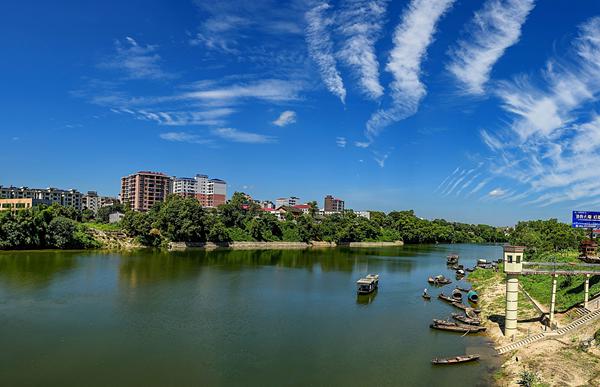

Villages across China have been working on water conservancy and water ecology protection through various means over the past few years. As a result, rivers and lakes in rural areas have become clean and beautiful, improving the quality of life for local villagers.
So far, nearly 30 percent of domestic sewage treatment of rural households across the country has been effectively controlled and managed, with the comprehensive environment in 25,000 administrative villages enhanced. Over 90 percent of administrative villages have been provided with garbage treatment systems, with access to sanitary toilets in rural areas exceeding 65 percent.

A view of Zhentou town of Liuyang city. (Changsha Evening News/Chen Fei)
Shuangqiao village, Zhentou town of Liuyang city, central China’s Hunan province, allocated over 4.6 million yuan (about $688,160) to improve toilets, reinforce pipe networks and perfect sewage disposal facilities. Besides, livestock farms were encouraged to use solar insecticidal lights and use fewer pesticides.
Today, domestic sewage of the villages is collected and transported through the pipes to then be treated at waste water treatment plants. Yuelong River in the village, which used to be seriously contaminated and full of garbage, has taken on a new look.
Moreover, since the 18th Communist Party of China National Congress, the Ministry of Water Resources has harnessed the main sections of over 4,300 key small and medium-sized rivers, enhancing the capability for responding to floods and waterlogging of rivers in rural areas, and improved water environment, laying a solid foundation for the development of new business models in the countryside.
Gucheng village, Wuxing district, Huzhou city in east China’s Zhejiang province has adopted different types of measures to harness a creek called Dongshao, including clearing silt, reinforcing levees, increasing vegetation coverage and building viewing platforms such as pavilions on the riverbanks.
The upgrading of the water environment has boosted the local tourism industry, with the village now maintaining B&B hotels and four agritainment restaurants, according to Chen Xinlong, Party Secretary of the village.
Likewise, there are roughly 50 agritainment restaurants on the riverbank of a creek called Huangtan in Zhuji city of Zhejiang province, generating 50 million yuan (almost $7.5 million) to the income of local villagers.
In order to protect water bodies in the long run, relevant mechanisms have been put in place.
Officials in the bureau of water resources of Changsha city introduced that a “river chief plus river cleaner” mechanism has been established, which requires inspecting the condition of the river on a regular basis. The problems spotted during the inspection tour and the solving of the problems are all recorded in a smart phone application.
Today, cutting-edge technologies, such as unmanned aerial vehicles and big data serve as a competent helper of the river chiefs, making their work more effective.
 Fire brigade in Shanghai holds group wedding
Fire brigade in Shanghai holds group wedding Tourists enjoy ice sculptures in Datan Town, north China
Tourists enjoy ice sculptures in Datan Town, north China Sunset scenery of Dayan Pagoda in Xi'an
Sunset scenery of Dayan Pagoda in Xi'an Tourists have fun at scenic spot in Nanlong Town, NW China
Tourists have fun at scenic spot in Nanlong Town, NW China Harbin attracts tourists by making best use of ice in winter
Harbin attracts tourists by making best use of ice in winter In pics: FIS Alpine Ski Women's World Cup Slalom
In pics: FIS Alpine Ski Women's World Cup Slalom Black-necked cranes rest at reservoir in Lhunzhub County, Lhasa
Black-necked cranes rest at reservoir in Lhunzhub County, Lhasa China's FAST telescope will be available to foreign scientists in April
China's FAST telescope will be available to foreign scientists in April "She power" plays indispensable role in poverty alleviation
"She power" plays indispensable role in poverty alleviation Top 10 world news events of People's Daily in 2020
Top 10 world news events of People's Daily in 2020 Top 10 China news events of People's Daily in 2020
Top 10 China news events of People's Daily in 2020 Top 10 media buzzwords of 2020
Top 10 media buzzwords of 2020 Year-ender:10 major tourism stories of 2020
Year-ender:10 major tourism stories of 2020 No interference in Venezuelan issues
No interference in Venezuelan issues
 Biz prepares for trade spat
Biz prepares for trade spat
 Broadcasting Continent
Broadcasting Continent Australia wins Chinese CEOs as US loses
Australia wins Chinese CEOs as US loses